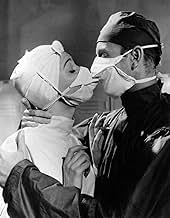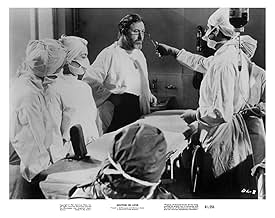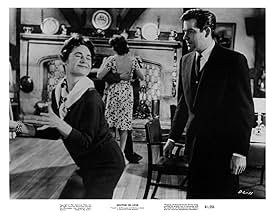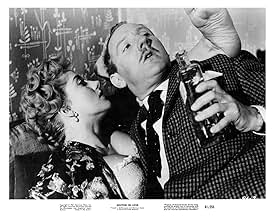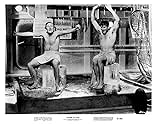Doctors Burke and Hare depart St. Swithin's for general practice. They visit Foulness anti-cold Unit as patients. Hare joins an upscale GP office, while Burke explores various medical positi... Read allDoctors Burke and Hare depart St. Swithin's for general practice. They visit Foulness anti-cold Unit as patients. Hare joins an upscale GP office, while Burke explores various medical positions.Doctors Burke and Hare depart St. Swithin's for general practice. They visit Foulness anti-cold Unit as patients. Hare joins an upscale GP office, while Burke explores various medical positions.
- Director
- Writers
- Stars
- Director
- Writers
- All cast & crew
- Production, box office & more at IMDbPro
Featured reviews
Just caught this film on the Talking Pictures TV channel, and thought I might as well watch it.
I thought that I had seen them all but apparently not, it's ok and pretty much par for the course.
There is absolutely no need to look for any kind of plot in these movies, they were always bereft of such frivolities.
Rather like the Carry On movies that I suppose should be thought of as their successors, or rather more of the Follow On's.
Oh dear I am afraid that is an example of my jokes and also somewhat, of the level of humour presented in these films.
They are all both improbable and predictable in their sets, scenes and characters, which fits in perfectly with the plethora of different actors.
What saved the movie for me from the usual run of them is the inimitable, James Robertson Justice as the irascible Sir Lancelot Spratt.
Personally he is the film he has by far the best lines and provides easily, the funniest scenes in the entire film.
I thought that I had seen them all but apparently not, it's ok and pretty much par for the course.
There is absolutely no need to look for any kind of plot in these movies, they were always bereft of such frivolities.
Rather like the Carry On movies that I suppose should be thought of as their successors, or rather more of the Follow On's.
Oh dear I am afraid that is an example of my jokes and also somewhat, of the level of humour presented in these films.
They are all both improbable and predictable in their sets, scenes and characters, which fits in perfectly with the plethora of different actors.
What saved the movie for me from the usual run of them is the inimitable, James Robertson Justice as the irascible Sir Lancelot Spratt.
Personally he is the film he has by far the best lines and provides easily, the funniest scenes in the entire film.
By 1960 Dirk Bogarde deemed himself too old and serious to continue as Simon Sparrow in the series of medical romps from Richard Gordon's novels. Instead Michael Craig, a former extra who looked similar though more thickset, was top-billed in "Doctor in Love". That he and his partner Leslie Phillips should be named Drs Burke and Hare says everything about a string of mildly farcical incidents, laced with lavender-blue dialogue poised on the brink of permissiveness, which kept the pot boiling for Betty Box and Ralph Thomas.
In truth Craig also is too serious for the part. He had just co-written the anti-trade union screenplay for "The Angry Silence" and seems preoccupied, letting the ebullient Phillips treat him as a stooge in almost every joint scene. There are other dampeners. Lancelot Spratt (James Robertson Justice) is no longer hovering continuously in the background as the ogre of the medical school-- the doctors are taking first steps in general practice-- and the love interests are Carole Lesley (aka Maureen Rippingdale) and Virginia Maskell, both of whom could have featured in a "Pinewood Babylon" sleaze book as future suicides. Poor Miss Maskell, Craig's love interest, had the saddest starlet's eyes since Gail Russell.
Never mind: there's Joan Sims and Liz Fraser as randy strippers to enliven the earlier sequence in a cold-cure laboratory, plus Irene Handl playing against her usual charlady type as a very butch, tweedy female professor. More camp comes from the inimitable Reggie Beckwith as factotum in Craig's surgery-- "I'm a sort of Universal Aunt, you might say"-- and he puts on a fine drunk scene in a police station. For star spotters there is a glimpse of "Last of the Summer Wine"'s Peter Sallis, unbilled, as a patient. Other Britflick support favourites such as chinless wonder Nicholas Phipps, Esma Cannon and John Le Mesurier pop up.
One episode embroiling Spratt in a police raid on a strip club next to a lecture hall is notably well staged. The film rolls briskly along: Thomas, never more than a journeyman, was rarely less than competent at storytelling, a skill sadly missed these days. Three years later he persuaded Bogarde to come back for a final crack at Sparrow in "Doctor in Distress".
In truth Craig also is too serious for the part. He had just co-written the anti-trade union screenplay for "The Angry Silence" and seems preoccupied, letting the ebullient Phillips treat him as a stooge in almost every joint scene. There are other dampeners. Lancelot Spratt (James Robertson Justice) is no longer hovering continuously in the background as the ogre of the medical school-- the doctors are taking first steps in general practice-- and the love interests are Carole Lesley (aka Maureen Rippingdale) and Virginia Maskell, both of whom could have featured in a "Pinewood Babylon" sleaze book as future suicides. Poor Miss Maskell, Craig's love interest, had the saddest starlet's eyes since Gail Russell.
Never mind: there's Joan Sims and Liz Fraser as randy strippers to enliven the earlier sequence in a cold-cure laboratory, plus Irene Handl playing against her usual charlady type as a very butch, tweedy female professor. More camp comes from the inimitable Reggie Beckwith as factotum in Craig's surgery-- "I'm a sort of Universal Aunt, you might say"-- and he puts on a fine drunk scene in a police station. For star spotters there is a glimpse of "Last of the Summer Wine"'s Peter Sallis, unbilled, as a patient. Other Britflick support favourites such as chinless wonder Nicholas Phipps, Esma Cannon and John Le Mesurier pop up.
One episode embroiling Spratt in a police raid on a strip club next to a lecture hall is notably well staged. The film rolls briskly along: Thomas, never more than a journeyman, was rarely less than competent at storytelling, a skill sadly missed these days. Three years later he persuaded Bogarde to come back for a final crack at Sparrow in "Doctor in Distress".
The first 'Doctor' film without Dirk Bogarde is also the first to strongly resemble a 'Carry On', with several veterans of the 'Carry On' series (including Joan Sims, also in the original 'Doctor in the House') and several others who became features of the smuttier parallel series. The humour was already becoming more off-colour here (and it's in colour, which the budget of the 'Carry On's didn't yet run to).
We actually see Lady Spratt in this episode (played by Ambrosine Phillpotts), but James Robertson Justice is himself absent much of the time; while in place of Bogarde we get the more abrasive Michael Craig, who plainly doesn't fit in with such frivolity and otherwise steered well clear of either series.
We actually see Lady Spratt in this episode (played by Ambrosine Phillpotts), but James Robertson Justice is himself absent much of the time; while in place of Bogarde we get the more abrasive Michael Craig, who plainly doesn't fit in with such frivolity and otherwise steered well clear of either series.
The plot such as it is is so light in substance but I must say the movie is pleasant. I very much doubt people who never sat in a cinema watching these movies will enjoy it, for me its a lovely memory.Not much happens in the movie and you might smile but don't expect any big laughs.James Robertson Justice as always walks away with the film. I sometimes find Leslie Philips a little annoying and although very sauve he comes across as rather sleezy. Joan Sims has a delightful, all too brief cameo. Its funny how the world has changed, these days the guys in this movie would be up on sexual harrassement charges. Its perfectly normal in this movie for doctors to flirt with nurses. This was a much kinder time. THese days men cant flirt and its safer to be gay. Dirk is not there but Michael Craig is a pleasant leading man. He is very good looking and he gives a gentle performance. Its all very sweet, restrained and under played. Craig came to Australia for the JCW management to star in a few west end comedies and later residing here and became much loved as a TV performer in shows such as Medical Centre"
More medical antics in the classic "doctor" series. What plot there is concerns 2 young doctors (Burke & Hare) attempting to drag a quaint old medical practice into the 20th century. Doctor In Love does lose something without Dirk Bogarde, but the wonderful James Robertson Justice "I shall do nothing of the kind!" makes up for it. There were excellent small roles for Joan Sims as a stripper and John le meseruir (I bet I've spelled that wrong?) as an officious doctor who dares to tangle with "Sir Lancelot". The scene where Robertson Justice accidentally finds himself in a strip club and then breaks through into the medical conference next door accompanied by strippers and a gorilla is hilarious. It's a sad coincidence that Virginia Maskell (the new young doctor) and Carole Lesley (Dr Burke's girlfriend) both ended their own lives a few years later. They were both beautiful. Doctor In Love isn't the best in the series (Michael Craig is NO Bogarde) but it's certainly worth watching and made me laugh quite a lot.
Did you know
- TriviaLiz Fraser (Leonora) and Fenella Fielding (Mrs. Tadwich) died only five days apart: Fraser on September 6, 2018 and Fielding on September 11, 2018.
- Quotes
Dr. Tony Burke: Tell me about yourself. Bare your soul.
Leonora: My soul? No ones ever asked to see that before.
- ConnectionsFeatured in Film Profile: Betty Box and Ralph Thomas (1961)
- How long is Doctor in Love?Powered by Alexa
Details
- Runtime
- 1h 33m(93 min)
- Sound mix
- Aspect ratio
- 1.37 : 1
Contribute to this page
Suggest an edit or add missing content



